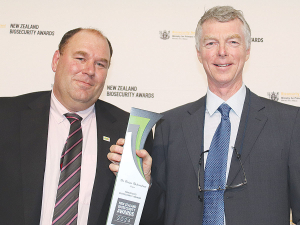He gave this assurance to Dairy News at the annual biosecurity awards which he hosted at Parliament, attended by more than 200 people. The awards are designed to recognise and celebrate inspiring and diverse biosecurity champions who are making significant contributions to biosecurity in New Zealand. These include schools, community groups, companies, science institutes and local authorities.
Hoggard says biosecurity has always been rated by governments and farmers as one of the most important contributors to the preservation of NZ's primary sector. He says it's vital for the country's prosperity and protects out $57.4 billion food and fibre sector as well as our unique flora and fauna.
"The biosecurity system run by MPI is our first line of defence against any incursions of a disease.
"I have been looking at the MPI budget and all the frontline activities and they are staying the same. It's around some of the backroom functions that MPI were looking to trim a bit. Given the constrained environment we are working in there is a need to look and see if things can be done smarter and faster and get better bangs for our bucks. But again, frontline services will be untouched," he says.
Referring to the awards, Hoggard says it's nice to recognise those people who are working at the grass roots level in biosecurity. He says it's important to recognise community groups and schools and other individuals and organisations who are playing a part in protecting the unique environment in which we live.
“If you look locally here in Wellington, all the predator free work that is going on; in other parts of the country it could be Caulerpa removal or getting boaties to clean their boats. The Government can out up signs and the like, but community involvement is critical,” he says.
As for the farming sectors’ response to biosecurity, Hoggard says most people are acting responsibly in terms of NAIT, but he says there is always room for improvement. He says the aim is to encourage better behaviour at a farm level and look at new ways for farmers to improve their biosecurity and build on the work that was done during the M. bovis outbreak.
“I would be keen to see if we could do the same in regards to BVD and Johne’s and utilising the NAIT systems that are already in place,” he says.
Award Winners
Among the winners at the awards was the company VeritAg which played a pivotal role at the height of the Mycoplasma bovis outbreak.
This small company, represented at the awards by two of its directors, Richard Campbell and Cynthia Northcote was responsible for mobilising veterinary practices around the country to take samples from potentially infected farms.
They also worked closely with SVS labs to speed up the testing of the samples. At the time MPI didn’t have the capacity in-house to do this work and asked VeritAg for help.
The other major award presented at the evening was the Ministers own Biosecurity Award. This went to long serving SCION scientist Dr Brian Richardson, recognising his outstanding contributions to NZ biosecurity over many years.
Richardson has been involved in a number of eradication programmes including wilding pines and invasive insects such as the painted apple moth, white-spotted tussock moth, and southern saltmarsh mosquito.


















